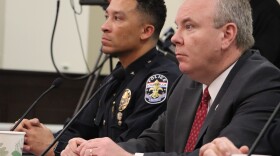Murray State University and the University of Louisville officials came together Thursday on the western Kentucky college’s campus to sign a letter of intent in the hopes of launching a new medical school.
The schools are collaborating on the program to help address the shortage of medical school opportunities in western Kentucky and to build partnerships with local hospitals in the region.
MSU president Bob Jackson highlighted the new collaboration as an opportunity for the two colleges to work together to make a dent in Kentucky’s physician shortage.
“ It's a workforce development tool. These are the things that we should be doing in our Commonwealth to advance it for the future, especially for our students,” Jackson said. “We want to keep you in this big multi-state region that we serve, and that's the key. We've got to do more in healthcare in Kentucky.”
Data from the Cicero Institute, a nonpartisan public policy organization, indicates that Kentucky is projected to be nearly 3,000 doctors short by 2030. The group also found that the state’s physician-to-patient ratio is 23% worse than the national average and that all but 13 of the Commonwealth’s 120 counties have been designated as health professional shortage areas.
During the press conference, officials with both universities broke down the collaborative program’s prospective 2+2 structure and the schools’ eventual goal to establish a full-scale medical school – a University of Louisville School of Medicine – on Murray State’s main campus.
The program is expected to allow pre-med students who complete their undergraduate studies at Murray State to enroll at the University of Louisville but attend classes at MSU for the first two years of medical school. Those students would then complete their next two years of medical school at the University of Louisville before returning to western Kentucky to complete a residency program.
In addition to the 2+2 program, Jackson said there are plans for a University of Louisville School of Medicine to be built on Murray State’s main campus.
For University of Louisville president Kim Schatzel, the school’s commitment to this new venture is a part of its efforts to serve the state as a whole.
“We're not just about Louisville,” she said. “The issues that we see across the Commonwealth are shared: healthcare disparities, access to healthcare and we know the fact that we need to be able to address that as universities because of the fact that we're anchor institutions and dedicated to public service and the common good.”
Dr. Kelli Bullard Dunn is a vice dean of the University of Louisville’s School of Medicine. She added that the partnership aims to strengthen the healthcare infrastructure in the western Kentucky.
“Our focus is on the needs of the region and on building regionally, so that students who are born and raised here can come to Murray State, then go to medical school here, do their residency and stay [in the area],” she said. “My long-term goal is to build something that is unique and extraordinary, so it serves the region and becomes attractive to people outside the region, bringing people in.”
Jackson noted that many local medical center directors and staff members attended the announcement to support the new partnership. He said this new program is meant to develop the future healthcare workforce that is already embedded in the hospitals and the region.
Task forces for both schools are working to establish a timeline for the collaboration. No date was set for the construction of a medical school or for open enrollment in the program.
Jackson called the joint venture “a big initiative” and said more specialized programs could be added after it was initially established. Schatzel said the process will be complex and “multi-year,” but that both schools are “deeply committed” to the collaboration.
“You don't dabble in medical schools,” Schatzel said. “You really have to do the planning up front to be able to execute it.”





